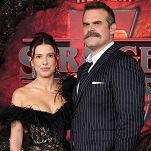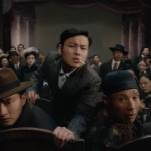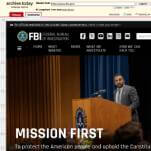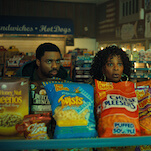In The Catch-Up, a longtime fan and a newcomer discuss a TV show, movie, book, music, or other pop-culture item. In this installment, Jason Heller and Keith Phipps discuss Judas Priest’s Screaming For Vengeance, the British metal band’s famed 1982 album, which recently received a deluxe reissue.
Jason: Keith, when I visited The A.V. Club office in Chicago recently, I grabbed a promo copy of the 30th-anniversary edition of Judas Priest’s Screaming For Vengeance, which just came out on Sept. 4. I love the album, and I got all giddy about it. You were standing next to me, and you said something about how you never got into metal as a kid because it was too scary. You seemed to be simultaneously joking and serious. Later it got me thinking: You and I are the same age, and although I’m sure we had our own unique childhoods, we were probably exposed to many pieces of pop culture at roughly the same time. Why did Priest appeal to me but not you?
The more I thought about it, the more I realized it was a little more complicated than that. To be honest, metal scared me, too. I vividly remember being babysat around the age of 6—this would have been 1978—and seeing a copy of Kiss’ Destroyer in my babysitter’s house. The cover terrified me. Yet I couldn’t get it out of my head. I grew up in a household where rock music of all kinds was constantly being played, but metal wasn’t popular enough to be on the radio back then. Granted, Kiss isn’t exactly the epitome of metal; it’s more of a hard-rock band. But as far as I was concerned, it was the same thing. Metal presented this dark, forbidden barrier that older kids were able to pass through. I was neither tough nor cool enough to enter.
That all changed in the early ’80s, when metal went mainstream. Judas Priest had a lot to do with that. The band’s 1980 masterpiece, British Steel, helped launch the New Wave of British Heavy Metal, although Priest was a little too old and established to be part of the movement itself. In the U.S., though, Screaming For Vengeance was Priest’s big breakthrough. Led by the snarling hit single “You’ve Got Another Thing Coming,” it isn’t quite as good as British Steel—which saw a huge surge in sales and airplay thanks to Vengeance—but it’s pretty damn close. I was 10 at the time, and to me, Judas Priest was more or less the same as Billy Idol: catchy, leather-clad, bad-boy rock ’n’ roll that appealed to my imminent adolescence. It was still scary to a certain degree, but it was also pop music, and I responded to it.
Before long, I was listening to everything from Van Halen to Iron Maiden to Ratt (that is, before I discovered David Bowie in seventh grade, but that’s another story). Not to sound too much like Chuck Klosterman in Fargo Rock City, but bands like Judas Priest helped expand the scope of what I considered to be “musical”—but more than that, they provided an escapist fantasy for a kid who desperately needed escape. Which was probably part of the reason I got into superhero comics and science fiction, but again, another story! Like many kids who listened to metal, I grew out of it and back into it at various points in my life, and now I write a column about it every month for The A.V. Club. But I find it really fascinating, Keith, that you never succumbed to the lure of Priest—probably the most accessible yet quintessential metal band that ever invaded the airwaves. So my question to you is: Were you really scared of Judas Priest as a kid? If so, why? And has listening to Screaming For Vengeance in advance of this discussion revealed anything new about your own perception of classic metal?
Keith: Oh yeah, I was scared of Judas Priest and everything metal in the early ’80s, and I think that’s largely because you and I grew up in very different circumstances. My parents were older and from the South—my dad was from Virginia and my mom from Kentucky. My mom will still talk about seeing The Beatles on The Ed Sullivan Show and calling her friends in horror. (Years later, when I got into them, she admitted that she found some of their songs pretty.) Rock ’n’ roll was regarded with great suspicion in our household. Complicating matters was the fact that I grew up going to a Southern Baptist church in the early ’80s at the height of the panic over Satanism. When I expressed interest in watching Kiss Meets The Phantom Of The Park on television, I was forbidden because someone had explained to my father that the word “Kiss” meant “kings of the devil.” (The urban legend that it was an acronym for “Kings In Satan’s Service” got lost in translation somewhere.)
Rock ’n’ roll—and by that I mean any popular music from Elvis on—was deemed the devil’s music until proven otherwise. I believed it, at least for a while, and when I finally started to get into contemporary music, I still believed it enough to stay away from metal (and Dungeons & Dragons, but that’s for another column). I had friends who listened to it, but I looked at them askance. Didn’t they know that AC/DC was short for “After Christ Devil Comes”? Eventually, I realized this was foolish, and while metal was never my main genre, by the late ’80s I was listening to Metallica and Anthrax (and, um, Queensryche) fairly regularly. Still, I was mostly getting my loud kicks elsewhere: To my ears, Pixies albums sounded scarier than anything the metal kids were listening to at the time. (I should add that since then I’ve dipped my toe into metal history, but only a little bit.)
Now when I hear ’80s metal, I’m filled with nostalgia: for what those metal kids played on their boomboxes and for the glimpses of metal I’d get flipping past MTV—and maybe lingering on it a bit when my parents weren’t in the room. So part of why I was eager to do this column with you was to try to understand what the appeal of it was, why people loved those squealing guitars, leather clothes, and devil imagery. And I think I’m starting to get it. But before we get to that, can we talk about the devil, which is mostly what kept me away the first time? It’s not like Satan didn’t play a role in ’80s metal or a role in this album, either, even if I now fully get that Judas Priest was mostly concerned about more earthly matters.
Jason: Before we dive into the devil (one of my favorite topics), let me respond to three things you just brought up. First of all: I’d always heard that Kiss could also stand for Knights In Satan’s Service. Which sounds even more awesome, right? Second: My mom also tells stories of seeing The Beatles on The Ed Sullivan Show. She had me when she was 17, though, so she was only 8 in 1964. At that young age, she had to beg my suspicious grandparents to let her watch it. Although you and I are the same age, Keith, it seems we may be almost a generation apart, at least in that regard; my mom definitely did not forbid any kind of music in her house. Third: I don’t know how I would have made it through adolescence without Dungeons & Dragons. What did you do with yourself as a teenager, anyway? Have friends? Play sports? Apply yourself at school? Talk to girls? I can only imagine!
Okay, back to Judas Priest. It’s funny that you bring up Satanism, since, as you mention, Priest was never known for its devil fixation. That was more Iron Maiden’s domain (“Number Of The Beast” also came out in 1982.) That said, I’m assuming the name Judas Priest itself conjures some negative connotations to anyone who grew up in a religious household. I was raised in an almost entirely secular environment, and the closest thing I ever heard to a prayer growing up was “Life’s a bitch and then you die”—which, in retrospect, would have made a great title for a Priest song.
Aside from its provocatively titled instrumental opener, “The Hellion,” Screaming For Vengeance boasts only one song that could be construed as Satanic: “Devil’s Child.” As Satanic metal goes, though, it’s about as half-assed you can get. Sure, frontman Rob Halford sings a lot about sin and sacrifice—over some very AC/DC-ish music, funnily enough—but it’s all an extended metaphor that’s merely toying with Satanic imagery. The titular devil’s child is obviously a lover who’s broken Halford’s heart, nothing more diabolical than that. Halford was still years away from coming out of the closet at that point, but the gender of the lover doesn’t matter. (Nor are there any homoerotic overtones to the song—a rarity for him back then.) But yes, Keith, you’re totally right: Halford’s lyrics were always much more concerned with earthly delights. And in fact, when the Parents Music Resource Center drew up its Filthy Fifteen—a list of songs deemed destructive to impressionable young minds—in 1985, Priest’s “Eat Me Alive” was included on the grounds of sexual content, not occultism.
Since we’re on the subject of controversy, though, there’s a line in “Devil’s Child” that unintentionally hints at tragedy to come. “Your condition breeds ammunition / Shoots me in the face,” Halford sings in one verse (which, read a certain way, may disprove my non-homoerotic theory). It’s no more or less cartoonish than any other line from the song. But, three years after the song’s release, two Nevada teens shot themselves in the face after allegedly listening to Priest. One died instantly; the other died in 1988 from complications arising from his injuries. Priest was taken to court and charged with hiding a subliminal message in its cover of Spooky Tooth’s “Better By You, Better Than Me”—one that, according to the prosecution, urged the boys to turn guns on themselves. Of course, backmasking is one of the charges made against metal as a whole in the infamous 20/20 Satanic-panic report you link to above. The case against Priest was ultimately dropped, but the infamy has haunted the band.
That’s far from the only controversy Priest has been embroiled in over the decades. Sadly, it still overshadows the band’s music. For instance, there’s the chilling, Panopticon-fearing, sci-fi alarmism of my favorite Screaming For Vengeance song, “Electric Eye.” Not to mention the fluid, sinuous riffage of “Bloodstone.” And then there’s the album’s searing title track, one of many proto-thrash anthems that helped to influence a new genre and generation. (See also: 1977’s groundbreaking “Dissident Aggressor.”) There’s some solid, classic songcraft going on in Priest songs, and Screaming For Vengeance has it all. Ballads, headbangers, filthy love songs, high-minded fantasy, and even a surprise hit single: “You’ve Got Another Thing Coming.” Keith, you mention the nostalgia that you feel as you listen to Priest today. Do you hear any of the intrinsic musical qualities that I do?
Keith: At first I would have said no. But I’m starting to. In fact, I’m starting to really like this album and wonder what else I missed from this era. I only recently listened to the Ronnie James Dio-era Black Sabbath albums, and I like them. Should I listen to Dio? Did all those denim-jacket kids fixated on Iron Maiden know what they were talking about? (Side note: Are their contemporary equivalents all Juggalos now? I once described the part of Ohio I came from to Nathan Rabin as being “full of Juggalos waiting to happen.”) Is this who I am now? Do I even know who I am anymore?
But back to Judas Priest: The more I listen to this album, the more diversity it reveals. I don’t really know what “Bloodstone” is about, but it just sounds badass. And I like the way it segues into the S&M power ballad “(Take These) Chains.” I just assumed that most Judas Priest songs were about sex with leather-clad men, but there’s nuance, too. This one’s about how leather-clad men can break your heart. (It even slips the word “precious” in for a delicate touch.) Then it’s on to “Pain And Pleasure,” which offers a variation on the same themes with riffs seemingly designed to crush walnuts. And that’s before “You’ve Got Another Thing Coming,” which I already knew and liked. That said, I’m not sure I hear the diversity here the way I hear it on, say, The White Album. But I don’t know that I need to, either.
It seems like a strange band to be a lightning rod for such controversy in retrospect, for all the reasons you laid out above. But as I remember the ’80s (sometimes hazily, admittedly), anything metal was considered threatening in some way, even metal grounded firmly in fantasy. (Maybe especially metal grounded firmly in fantasy.) The world of this album isn’t one of Satanic oaths, but there’s plenty of blood, sweat, and grit here, to say nothing of coded homoeroticism. Even if you don’t pick up on the gay references—and as hard as it is not to notice it now, it’s worth remembering that almost nobody seemed to pick up on it at the time—it all just sounds unsavory somehow. No doubt its unsavory elements were part of the album’s appeal at that time. How does it sound to you now, removed from that context?
Jason: Oh yes, you should listen to Dio. Backtrack from his Sabbath stuff to his tenure in Rainbow, then move forward to his early solo work. All joking about Juggalos aside—I don’t think there is a direct predecessor of that phenomenon, although there are definite shades of the Kiss Army in Insane Clown Posse’s, um, posse—you raise an intriguing question. Yank Priest out of its ’80s context, and how does it sound? You used the word “unsavory,” but I think that classic metal (and to some extent, today’s metal) operates as both artifice and honesty. Granted, those are broad, weighted words, but metal is also broad and weighted. You know, kind of like a sword.
Seriously, though, listening to Priest as a kid felt both unsavory and hilarious, both dangerous and silly. I liked metal, but I was no metalhead. I also dug everything from Michael Jackson to “Weird Al” Yankovic. I just liked music, and as much as my tastes have evolved over the years, that’s stayed the same. Now that I’ve absorbed so many other things, Priest is no more outrageous or transgressive than, say, P-Funk. A lot less, actually. As I mentioned above, there’s also a songwriting sensibility—a use of dynamics, craft, and, yes, harmony—to Screaming For Vengeance that many other metal acts of the ’80s didn’t possess. Again, Halford and crew were a bit older than much of their metal contemporaries; the band formed in the late ’60s, and like fellow vets The Scorpions and Dio, who suddenly found themselves superstars in the ’80s, Priest drew from a deeper, wider well of inspiration.
Some things can’t be glossed over. Priest is heavy, although more delicate and intricate than generally believed. Halford is screechy, although more nuanced and emotive than anyone gives him credit for. Screaming For Vengeance is not easy listening, and while it was written and played by dudes in their 30s, it definitely caters to a certain adolescent mindset. That said, I think I actually enjoy Screaming For Vengeance far more now than I did when I was a kid. Gauging one’s own nostalgia is a tricky proposition—especially with things like Heavy Metal Parking Lot retroactively coloring it—but at this point in my life, I feel like the music has taken on a new dimension. I can appreciate Screaming For Vengeance not just for its historical importance or the evocation of my youth, but for its craft, its ambition, its imagination, and even its playfulness. I always liked Priest, but I finally get Priest. If turning 40—as I did this year—means I’m somehow expected to no longer relate or respond to Screaming For Vengeance, well, you’ve got another thing coming.
Keith: I think a little distance helps, for me at least. I listened to a pretty wide variety of music once I belatedly got into it in junior high, but not as wide as I wished. There were some genres that seemed off-limits to me, either because of lingering Baptist fretting or dumb, adolescent ideas of identity. Listen to metal and you were a metal kid. Listen to hip-hop and that’s who you were. By the end of high school, I was listening to a little bit of metal and a little bit of hip-hop, but not as much as I should have. (I liked Public Enemy’s righteous fury, but N.W.A. just scared me, and I missed out on a lot of golden-age stuff by not being adventurous enough. But that’s another story.) On the cusp of turning 40 myself, I can listen to whatever I want to and enjoy it on its own terms. That might mean losing some of the tribal connection I used to feel as a teen, but who really wants to feel like a teen again anyway? Well, maybe for a little bit. This album is just undemanding powerage, to borrow a term from another band: just unself-conscious, loud rock fantasy stuff with enough of that nuance you talked about to reward repeat listens. I find a lot of metal thrilling on a song-by-song basis and exhausting in album form, but this has enough flow and variety to it to work as an album. Consider me won over and wondering what else I’ve dismissed over the years that I might now enjoy.







































